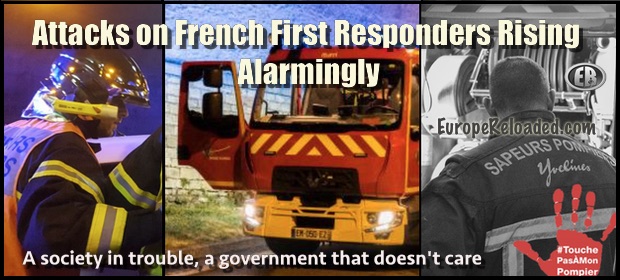
Attacks on French emergency workers reach record levels
French emergency workers have been facing a rising number of attacks while on duty.
FREEWEST MEDIA
Over the weekend in Aix-en-Provence, firefighters were trying to resuscitate an 80 year-old man in the Jas-de-Bouffan neighbourhood when the two emergency workers were tipped-off that their emergency vehicle was being stolen.
The campus in the neighbourhood houses the Institute of Research and Studies on the Arab and Muslim World (IREMAM) Aix-en-Provence, a multidisciplinary center of research on Arab culture.
The firefighters eventually found their vehicle, some 20 metres away from the scene, severly damaged.
On Saturday, in the immigrant city of Noisy-le-Roi near Paris, a 15-year-old assaulted the emergency crew who had come to his aid. The youth’s mother had called in an emergency after the teenager drank a mixture of pills and alcohol.
When the three emergency workers arrived, the youngster assaulted them, threatening to ”kill them”. Two of the three men suffered cuts and bruises to their faces and were unable to continue working for six and 10 days respectively. The youth was held in custody after being admitted to hospital.
In Calvi, on the island of Corsica, a firefighter was attacked by a man he was rescuing. The emergency worker had to admitted to intensive care with eight stitches to his head.
Since 2017, emergency crews have seen a rise of 23 percent in the number of assaults during their interventions. To address the problem, a decree was issued last month allowing crews to wear cameras to film interventions.
“The population is being abandoned. Emergency services cannot meet people’s needs anymore and emergency workers are the last link in this chain,” André Goretti, president of firefighters’ union the Fédération autonome des sapeurs-pompiers professionnels, told FranceInfo.
Goretti added: ”We need to provide an adequate response [for each intervention], but it takes time because we have fewer human resources. We take longer to intervene and people are getting irritated.
“When they feel like the response is not appropriate, they take it out on emergency crews.”
At the end of June this year, first responders called for a strike, denouncing the difficult and dangerous conditions they have to face daily. These included not only insufficient staffing but also the rising risk of assault.
In 2018, a report by the National Crime Observatory showed the dramatic increase: The number of emergency workers who claim to have been assaulted had risen by 23 percent from the previous year.
A total of 2,813 first responders said that they had been victims of an attack in 2018. More worrying is that the number had jumped by 213 percent in 10 years.
Also, and contrary to popular belief, relay antennas do not allow an ideal geolocation. There are more reliable technologies available these days, but France does not use automatic geolocation, which could would make it easier for responders to enter certain no-go zones.
With the current device, the perimeter to locate a call is on average two kilometers. “In 2019, it is shocking to learn that we can still die for lack of a sharp localization” Benoit Vivier, from the European Emergency Association Association (EENA), told FranceInter. They are struggling to improve the functioning and coordination emergency rescue services in Europe.
The Advanced Mobile rental (AML), founded in 2014, is a technology that automatically geotags a person who calls for help . This feature – which operates without internet – is integrated into Android and Apple phones. Once the location is established, an SMS is sent to the emergency service with the position in a radius of about twenty meters.
The AML is active in about fifteen countries (also in Moldova), and 10 in the European Union, including Austria, Belgium, Ireland and the United Kingdom. France and Italy do not have this device.
************
Original article

••••
The Liberty Beacon Project is now expanding at a near exponential rate, and for this we are grateful and excited! But we must also be practical. For 7 years we have not asked for any donations, and have built this project with our own funds as we grew. We are now experiencing ever increasing growing pains due to the large number of websites and projects we represent. So we have just installed donation buttons on our websites and ask that you consider this when you visit them. Nothing is too small. We thank you for all your support and your considerations … (TLB)
••••
Comment Policy: As a privately owned web site, we reserve the right to remove comments that contain spam, advertising, vulgarity, threats of violence, racism, or personal/abusive attacks on other users. This also applies to trolling, the use of more than one alias, or just intentional mischief. Enforcement of this policy is at the discretion of this websites administrators. Repeat offenders may be blocked or permanently banned without prior warning.
••••
Disclaimer: TLB websites contain copyrighted material the use of which has not always been specifically authorized by the copyright owner. We are making such material available to our readers under the provisions of “fair use” in an effort to advance a better understanding of political, health, economic and social issues. The material on this site is distributed without profit to those who have expressed a prior interest in receiving it for research and educational purposes. If you wish to use copyrighted material for purposes other than “fair use” you must request permission from the copyright owner.
••••
Disclaimer: The information and opinions shared are for informational purposes only including, but not limited to, text, graphics, images and other material are not intended as medical advice or instruction. Nothing mentioned is intended to be a substitute for professional medical advice, diagnosis or treatment.




